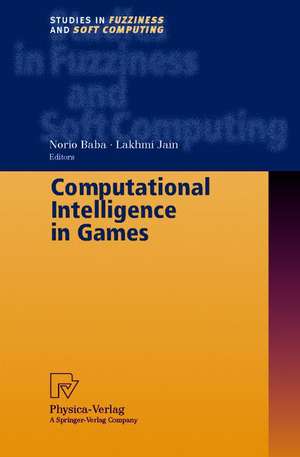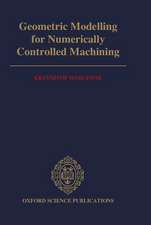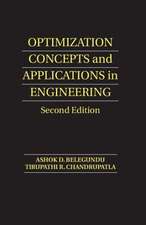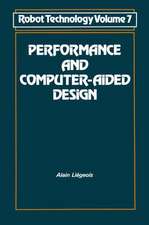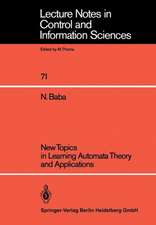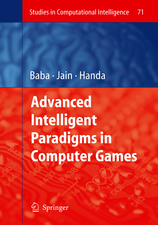Computational Intelligence in Games: Studies in Fuzziness and Soft Computing, cartea 62
Editat de Norio Babaen Limba Engleză Hardback – 27 feb 2001
| Toate formatele și edițiile | Preț | Express |
|---|---|---|
| Paperback (1) | 639.72 lei 6-8 săpt. | |
| Physica-Verlag HD – 8 aug 2012 | 639.72 lei 6-8 săpt. | |
| Hardback (1) | 645.79 lei 6-8 săpt. | |
| Physica-Verlag HD – 27 feb 2001 | 645.79 lei 6-8 săpt. |
Din seria Studies in Fuzziness and Soft Computing
- 20%
 Preț: 999.85 lei
Preț: 999.85 lei - 20%
 Preț: 653.06 lei
Preț: 653.06 lei - 20%
 Preț: 872.98 lei
Preț: 872.98 lei - 20%
 Preț: 930.57 lei
Preț: 930.57 lei - 20%
 Preț: 1051.00 lei
Preț: 1051.00 lei - 20%
 Preț: 992.44 lei
Preț: 992.44 lei - 20%
 Preț: 655.85 lei
Preț: 655.85 lei - 20%
 Preț: 1001.86 lei
Preț: 1001.86 lei - 18%
 Preț: 954.14 lei
Preț: 954.14 lei - 20%
 Preț: 330.10 lei
Preț: 330.10 lei - 20%
 Preț: 333.04 lei
Preț: 333.04 lei - 20%
 Preț: 997.56 lei
Preț: 997.56 lei -
 Preț: 391.61 lei
Preț: 391.61 lei - 20%
 Preț: 647.79 lei
Preț: 647.79 lei - 20%
 Preț: 986.01 lei
Preț: 986.01 lei - 18%
 Preț: 958.56 lei
Preț: 958.56 lei - 20%
 Preț: 996.40 lei
Preț: 996.40 lei - 20%
 Preț: 999.35 lei
Preț: 999.35 lei - 15%
 Preț: 646.43 lei
Preț: 646.43 lei - 20%
 Preț: 651.57 lei
Preț: 651.57 lei - 20%
 Preț: 997.89 lei
Preț: 997.89 lei - 15%
 Preț: 641.03 lei
Preț: 641.03 lei - 20%
 Preț: 1009.74 lei
Preț: 1009.74 lei - 20%
 Preț: 992.62 lei
Preț: 992.62 lei -
 Preț: 388.72 lei
Preț: 388.72 lei - 18%
 Preț: 1223.43 lei
Preț: 1223.43 lei - 20%
 Preț: 651.42 lei
Preț: 651.42 lei - 18%
 Preț: 951.59 lei
Preț: 951.59 lei - 18%
 Preț: 948.61 lei
Preț: 948.61 lei
Preț: 645.79 lei
Preț vechi: 807.24 lei
-20% Nou
Puncte Express: 969
Preț estimativ în valută:
123.59€ • 128.55$ • 102.03£
123.59€ • 128.55$ • 102.03£
Carte tipărită la comandă
Livrare economică 14-28 aprilie
Preluare comenzi: 021 569.72.76
Specificații
ISBN-13: 9783790813487
ISBN-10: 3790813486
Pagini: 176
Ilustrații: XII, 161 p.
Dimensiuni: 155 x 235 x 15 mm
Greutate: 0.43 kg
Ediția:2001
Editura: Physica-Verlag HD
Colecția Physica
Seria Studies in Fuzziness and Soft Computing
Locul publicării:Heidelberg, Germany
ISBN-10: 3790813486
Pagini: 176
Ilustrații: XII, 161 p.
Dimensiuni: 155 x 235 x 15 mm
Greutate: 0.43 kg
Ediția:2001
Editura: Physica-Verlag HD
Colecția Physica
Seria Studies in Fuzziness and Soft Computing
Locul publicării:Heidelberg, Germany
Public țintă
ResearchCuprins
1 Introduction to computational intelligence paradigms.- 1 Introduction.- 2 Search and knowledge representation.- 3 Probability-based approaches.- 4 Fuzzy logic.- 5 Artificial neural networks.- 6 Genetic algorithms.- 7 Rough sets.- 8 Fusion.- 9 Discussion and conclusion.- References.- 2 Evolving a neural network to play checkers without human expertise.- 1 Introduction.- 2 Background on neural networks and evolutionary computation.- 3 Background on computer programs for checkers.- 4 Method and results of evolving neural networks for checkers from scratch.- 5 Discussion.- References.- Appendix: Moves for Game 1 — Anaconda vs. “Beatrice” from Hoyle’s Classic Games.- 3 Retrograde analysis of patterns versus metaprogramming.- 1 Introduction.- 2 The game of Hex and the game of Go.- 3 Retrograde analysis of patterns.- 4 Metaprogramming.- 5 Using the generated knowledge.- 6 Future work and conclusion.- References.- 4 Learning to evaluate Go positions via temporal difference methods.- 1 Introduction.- 2 Temporal difference learning.- 3 Network architecture.- 4 Training strategies.- 5 Empirical results.- 6 Summary.- References.- 5 Model-based reinforcement learning for evolving soccer strategies.- 1 Introduction.- 2 The soccer simulator.- 3 RL with CMAC models.- 4 PIPE.- 5 Experiments.- 6 Conclusion.- References.- Appendix A: Prioritized sweeping.- Appendix B: Non-pessimistic value functions.- Appendix C: Q(?)-learning.- 6 Fuzzy rule-based strategy for a market selection game.- 1 Introduction.- 2 Market selection game.- 3 Game strategies.- 4 Fuzzy rule-based strategy.- 4.1 Fuzzy Q-learning.- 4.2 Simulation results.- 4.3 Knowledge acquisition.- 5 Conclusions.- References.- List of Contributors.
Textul de pe ultima copertă
The recent advances in computational intelligence paradigms have generated tremendous interest among researchers in the theory and implementation of games. Game theory involves the mathematical calculations and heuristics to optimize the efficient lines of play. This book presents the main constituents of computational intelligence paradigms including knowledge representation, probability-based approaches, fuzzy logic, neural networks, genetic algorithms, and rough sets. It includes a new approach of evolving a neural network to play checkers without human expertise. The book will be useful to researchers and practitioners who are interested in developing game techniques in computational intelligence environment.
Caracteristici
Presentation of state-of-the-art concepts and most recent research on the application of computational intelligence techniques in games Including a new approach of evolving a neural network to play checkers without human expertise which has well competed against commercially available software
